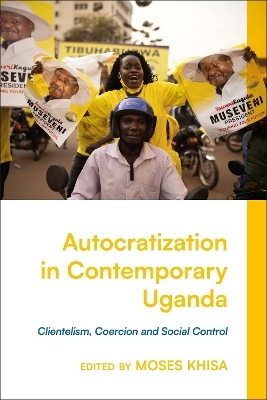
Autocratization in Contemporary Uganda
Zed Books Ltd (Verlag)
978-1-350-32354-4 (ISBN)
- Noch nicht erschienen (ca. August 2025)
- Versandkostenfrei innerhalb Deutschlands
- Auch auf Rechnung
- Verfügbarkeit in der Filiale vor Ort prüfen
- Artikel merken
Surveying that trajectory since 1986, the book takes as its primary focus the years since 2005; bringing to the fore the ‘autocratic turn’, placing it within a broader comparative lens, and enriching it with comparative references to cases outside of Uganda. While positing the notion of 'autocratic adaptability' as a defining hallmark of Museveni’s rule, the book examines the factors and forces that have made that adaptability possible, analysing the dynamics around three keys themes: institutions, resources, and coalitions. Through empirical research, each chapter seeks to demonstrate how either one or two of these three variables have functioned in propelling autocratization and assuring regime resilience - producing theoretical and and comparative implications that reach beyond Uganda.
Moses Khisa is Associate Professor of Political Science and Africana Studies, North Carolina State University, USA.
PREFACE
ACKNOWLEDGEMENTS
INTRODUCTION: Theory and Trajectory of Autocratization in Contemporary Uganda
Moses Khisa, North Carolina State University, USA
Part I: CLIENTELISM AND RESOURCES
Chapter 1: Political Clientelism and Museveni’s Authoritarianism
Nelson Kasfir, Dartmouth College, USA
Chapter 2: “The one and only Revolutionary President”: Heritage, Memory and the Personalisation of NRM Rule
Jonathan Fisher, University of Birmingham, UK, and Stephanie Cawood, University of the Free State, South Africa
Chapter 3: Museveni and Government-Foreign Business Relations in the Electricity Sector
Roger Tangri and Andrew M. Mwenda
Part II: CO-OPTATION, COERCION & SOCIAL CONTROL
Chapter 4: State Co-optation of Feminism: Unpacking the Paradoxes of Political Representation
Tabitha Mulyampiti, Makerere University, Uganda
Chapter 5: Obstructing Civil Society: State Backlash, Co-optation and Coping Mechanisms
Mesharch W. Katusiimeh, Kabale University, Uganda
Chapter 6: Uncertainty, Militarism and the Politics of Regime Survival
Sabastian Rwengabo, Centre for Basic Research, Uganda
Chapter 7: The Military as an Instrument of Regime Survival
Gerald Bareebe, York University, Canada
Chapter 8: Institutionalized Arbitrariness as Autocratic Adaptability
Rebecca Tapscott, University of York, UK
Part III: INSTITUTIONS AND COALITION POLITICS
Chapter 9: Between Change and Continuity in the Ruling Coalition
Moses Khisa, North Carolina State University, USA
Chapter 10: Autocratization by Elections
Anders Sjögren, Uppsala University, Sweden
Chapter 11: From Movement to Multiparty: The State and the Role of Political Parties
Frederick Golooba-Mutebi, Uganda Martyrs University, Uganda, and Mesharch W. Katusiimeh, Kabale University, Uganda
CONCLUSION: Uganda at Political Crossroads?
Moses Khisa, North Carolina State University, USA, and Sabastiano Rwengabo, Centre for Basic Research, Uganda
Index
| Erscheint lt. Verlag | 21.8.2025 |
|---|---|
| Sprache | englisch |
| Maße | 156 x 234 mm |
| Themenwelt | Sozialwissenschaften ► Politik / Verwaltung ► Politische Systeme |
| Sozialwissenschaften ► Politik / Verwaltung ► Politische Theorie | |
| ISBN-10 | 1-350-32354-3 / 1350323543 |
| ISBN-13 | 978-1-350-32354-4 / 9781350323544 |
| Zustand | Neuware |
| Haben Sie eine Frage zum Produkt? |
aus dem Bereich


